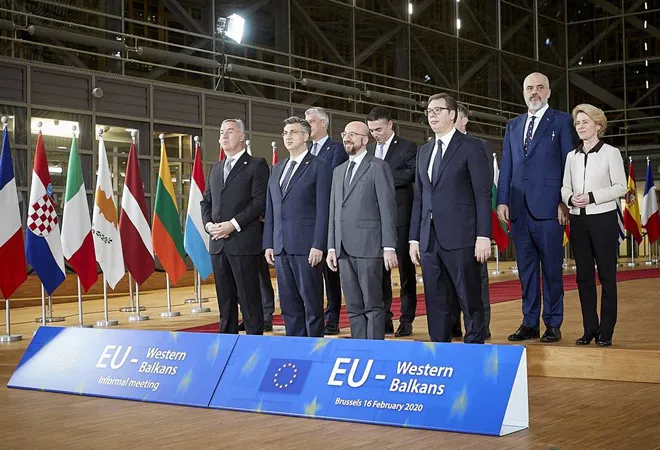
Amidst spiralling energy and cost of living crisis, and the ongoing Ukrainian crisis—two key decisions were taken by the European Union (EU) which are expected to have a long-term impact on the integration of the Union. These include: First, doubling down by the EU on its commitment to include the Western Balkan countries
<1> during the EU-Western Balkan Summit; second, acceptance of the candidature of Bosnia-Herzegovina for membership to the Union. These developments came after the EU agreed to grant candidate status to both Ukraine and Moldova in June 2022. While this is not the first time that the EU has committed to the enlargement of the Union, the crisis in Ukraine and the growing presence of China in the region have added a sense of urgency to accelerate the process. This article analyses the EU-Western Balkans Summit, recent developments in the enlargement process and the candidature status of the countries in the region.
The December Summit
The EU-Western Balkan Summit was held in Tirana, Albania on 6 December 2022 and was the first summit to be held in a Western Balkan state. During the summit, the EU “reconfirmed its full and unequivocal commitment to the European Union membership perspective of the Western Balkans” and called for the “acceleration of the accession process, based upon credible reforms by partners, fair and rigorous conditionality and the principle of own merits.”
The key highlights of the Tirana Declaration included—“first, Energy Support Package of €1 billion to cushion the impact of energy crisis and further clean transition for the region. Second, creating opportunities for the youth of the region by integrating region’s universities into EU initiatives such as Erasmus+, the European Solidarity Corps and the European Universities initiative. Third, reduction of roaming costs between the EU and Western Balkans in 2023, with a view to full removal thereafter. Fourth, the EU committed to work Balkan countries to develop their defence capabilities and capacities, including through the European Peace Facility”.
The prospects of enlargement of the EU are defined under Copenhagen Criteria which include stable democratic institutions, respect for rule of law, and a functioning market economy.
While the summit had many deliverables, one of the key agenda points under discussion was the enlargement of the Union to include six countries from the region. The EU reiterated its commitments towards the region, but it did not announce a timeline for the same. While there have been positive signs during the year such as—an agreement by EU leaders for Moldova and Ukraine to become candidates for EU membership in June 2022; the Union began accession negotiations with Albania and North Macedonia in July 2022 and in December 2022, the Union granted candidate status to Bosnia—the key question on the speed with which these countries can become members of the Union, given that they are at different levels of preparedness, remains unanswered.
A look at the candidature status
The prospects of enlargement of the EU are defined under
Copenhagen Criteria which include stable democratic institutions, respect for rule of law, and a functioning market economy. These criteria are to be met by the aspiring country along with its administrative capacity to implement the EU legislation and rules. To stabalise these countries both politically and economically, the conditions for membership were put in place in 1999 under Stabilisation and Association Process (SAP). Within this, each country signed a Stabilisation and Association Agreement (SAA) with the EU as the first step towards membership.
Map of Western Balkans
 Source: BBC News
Source: BBC News
So far, EU has opened accession talks with Montenegro (2012) and Serbia (2014). The negotiations on various accession clusters for both countries are in process. Albania and North Macedonia were granted candidate status in 2014 and 2009 respectively. As Brussels has been considering their application together, their negotiations were stalled due to the Greek
<2> and Bulgarian veto of North Macedonia’s membership. However, the EU opened negotiations in July 2022 after North Macedonia
committed to amend its constitution to recognise the Bulgarian minority in the country. Kosovo signed SAA with the EU in 2016 and formally
applied for membership on 15 December 2022. The problem with Kosovo’s bid is that five of 27 EU member states (Slovakia, Romania, Greece, Cyprus, and Spain) do not, at present, recognise the independence of the country. Bosnia and Herzegovina were granted candidate status in December 2022 and the negotiations yet to begin.
The progress on the negotiations is highlighted in the Commission’s annual enlargement reports. The recent reports highlighted that the countries have made little progress in implementing the EU’s directives. For example, in the case of
Montenegro, negotiations were stalled largely due to political instability and because it was only “moderately prepared to cope with competitive pressure and market forces within the EU”. However, for
Serbia, the report highlighted that Belgrade needs to align itself with the EU foreign policy—a reference to the country’s refusal to join EU sanctions on Russia. It also referred to the need to normalise relations with Kosovo so as to advance in its membership process.
As Brussels has been considering their application together, their negotiations were stalled due to the Greek and Bulgarian veto of North Macedonia’s membership.
While Albania and North Macedonia were moderate in their success in implementing the regulations,
Kosovo was called on to “engage more constructively and make further substantial efforts on the implementation of all past agreements and contribute to reaching a comprehensive legally binding normalisation agreement with Serbia”. In case of
Bosnia, it was said that Republika Srpska hindered the functioning of the governmental institutions in 2022 and also “contested the country’s alignment with EU statements and obstructing the full implementation of restrictive measures against Russia”.
Accelerated membership
While the Western Balkan countries have been in pipeline for the membership, the enlargement fatigue in many of the member states has stalled the progress. However, two critical issues have created momentum for the EU to expedite the process. First, the Ukrainian crisis has created an impetus for the Union to safeguard its security and influence as member states are concerned about the Russian sway in the region. The crisis has led to a realisation that the EU needs to do more for its extended neighbourhood. This was highlighted in High Representative Josep Borrell’s
statement that “this war is sending shock waves, it affects everybody and especially this region”. Regarding enlargement, he stated that the “road to accession was a two-way street”—making it clear that further reforms were needed before these countries could become members of the Union. However, the Summit also appeared to be an attempt to align the foreign policies of these countries along the line of the EU. This was primarily due to the stand taken by Serbia. Belgrade has refused both to condemn Russia for its actions and to join western sanctions on Moscow.
The Ukrainian crisis has created an impetus for the Union to safeguard its security and influence as member states are concerned about the Russian sway in the region.
Second is the increasing presence of China. Beijing has engaged with the Western Balkan countries under the Belt and Road Initiative (BRI) and 14+1 initiative. This has meant that the region has been able to attract Chinese investments, with Beijing becoming a significant economic partner, with investments ranging from the energy sector to infrastructure development. The
major beneficiary has been Serbia with over 7 billion euros in investment, mostly in the form of loans to finance the infrastructure and energy projects. The Union has been concerned regarding the BRI undermining its rules and regulations related to the environment, labour standards, debt crisis, non-transparency in financial regulations, etc. These concerns came to the forefront with Montenegro whose debt climbed to more than a 100 percent of its gross domestic product as it
struggles to repay a Chinese loan it took out in 2014 to help finance the highway project. According to the
Balkan Investigative Reporting Network, there are total 122 projects involving China amounting to approximately 28 billion euros.
Is EU ready?
The current momentum towards enlargement appears to have been largely due to the fear of spillover of the Ukraine conflict and increasing Chinese influence in the region. The question is whether this momentum can be sustained. This is primarily because—while the region is on the EU’s agenda, the Union is already under stress with many other policy priorities: handling the Ukraine conflict, energy crisis, post-COVID economic recovery, migration, climate change, energy transition, and tackling inflation, to name a few. Moreover, accession process is lengthy and the candidate countries are expected to meet a detailed host of economic and political conditions defined in chapters grouped together in thematic clusters.
The Union has been concerned regarding the BRI undermining its rules and regulations related to the environment, labour standards, debt crisis, non-transparency in financial regulations, etc.
While the public opinion in the EU is in the favour of enlargement—increasing to 57 percent according to EU Barometer
Summer Poll 2022 as compared to 47 percent in the
Winter Poll 2021—the integration process remains incremental. This is primarily because, on one hand, the annual reports on enlargement highlights that substantial reforms are required before these countries can become part of the Union, and on the other hand, several member states such as France, Austria, etc. have a lukewarm approach towards the process. As the enlargement also poses critical questions on migration, foreign policy alignment, national budgets, and economic market integration,;these issues are likely to stall the progress. Moreover, the
June 2022 Council conclusion highlighted that the process would also depend upon the “EU’s capacity to absorb new members”. The conflict in Ukraine and the attention to the region from China may have created the push towards EU enlargement but the momentum might be hard to maintain.
<1> Montenegro, North Macedonia, Serbia, Montenegro, Bosnia and Herzegovina, and Kosovo
<2> Accession talks were blocked by Greece over the use of name Macedonia. Both Greece and North Macedonia signed Prespa Agreement in 2018 to resolve the issue and pave the way for further accession talks.
The views expressed above belong to the author(s). ORF research and analyses now available on Telegram! Click here to access our curated content — blogs, longforms and interviews.



 Amidst spiralling energy and cost of living crisis, and the ongoing Ukrainian crisis—two key decisions were taken by the European Union (EU) which are expected to have a long-term impact on the integration of the Union. These include: First, doubling down by the EU on its commitment to include the Western Balkan countries
Amidst spiralling energy and cost of living crisis, and the ongoing Ukrainian crisis—two key decisions were taken by the European Union (EU) which are expected to have a long-term impact on the integration of the Union. These include: First, doubling down by the EU on its commitment to include the Western Balkan countries
 PREV
PREV


